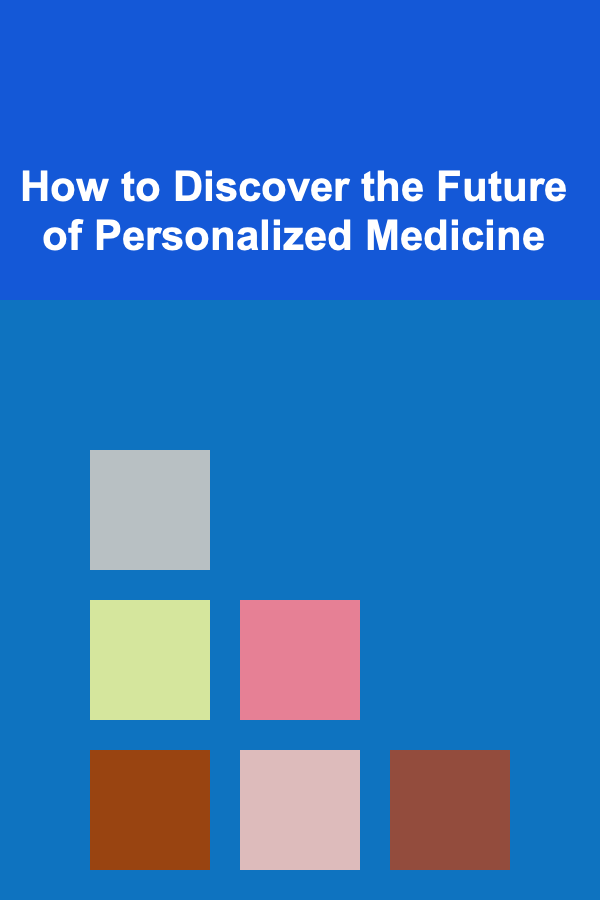
How to Discover the Future of Personalized Medicine
ebook include PDF & Audio bundle (Micro Guide)
$12.99$8.99
Limited Time Offer! Order within the next:

Personalized medicine, also known as precision medicine, represents a revolutionary shift in healthcare. Rather than adopting a one-size-fits-all approach, personalized medicine tailors medical treatment and healthcare strategies to the individual characteristics of each patient. This includes genetic, environmental, and lifestyle factors. The potential for personalized medicine to transform healthcare is immense, offering more effective, targeted, and individualized treatments that can significantly improve patient outcomes.
But how can we discover the future of personalized medicine? This article explores the emerging trends, technologies, and scientific advancements that will shape personalized medicine in the years to come. We will look at current breakthroughs, challenges to be addressed, and what the future might hold for patients, healthcare professionals, and researchers.
The Rise of Genomic Medicine
One of the most significant drivers of personalized medicine is the rapid advancements in genomics. The Human Genome Project, completed in 2003, mapped the entire human genome and laid the foundation for the development of genomic medicine. Today, we can sequence an individual's genome for a fraction of the cost it once took. The increasing accessibility and affordability of genomic sequencing have opened the door to personalized treatments based on a person's genetic makeup.
Genetic Sequencing and Its Role
Genetic sequencing involves decoding the DNA in an individual's cells to identify genetic mutations and variations that can affect health. By understanding a patient's genetic code, healthcare providers can pinpoint susceptibility to specific diseases, predict how a person might respond to certain drugs, and even uncover potential health risks before they manifest.
A practical example is in oncology, where genetic profiling of tumors is used to tailor treatment plans for cancer patients. By identifying mutations in cancer cells, doctors can choose therapies that target those specific genetic alterations, which are more likely to be effective than traditional treatments that are not personalized.
Pharmacogenomics: Tailoring Medications
Pharmacogenomics is the study of how a person's genetic makeup influences their response to drugs. This field is at the core of personalized medicine because it allows doctors to prescribe the most effective medications at the right doses, minimizing adverse drug reactions and maximizing therapeutic benefits.
For example, some people metabolize drugs more slowly due to genetic variations, leading to potential toxicity. Others might not respond to a particular medication at all. Understanding these genetic factors helps healthcare providers avoid trial-and-error prescribing and choose the optimal drug and dosage from the start.
CRISPR Technology and Gene Editing
Gene editing tools like CRISPR-Cas9 have revolutionized genetics by allowing precise alterations to DNA. In personalized medicine, CRISPR holds tremendous potential for correcting genetic mutations that lead to diseases. Researchers are exploring ways to use CRISPR to treat genetic disorders such as cystic fibrosis, muscular dystrophy, and sickle cell anemia.
While there are still ethical and safety concerns to address, the ongoing research into gene editing could lead to curative therapies for genetic diseases, providing a glimpse of the future of personalized medicine where genetic conditions are treated at the molecular level.
Artificial Intelligence and Machine Learning in Personalized Medicine
Artificial Intelligence (AI) and Machine Learning (ML) are increasingly being integrated into personalized medicine. These technologies are used to analyze massive amounts of data, predict disease risks, and recommend individualized treatment plans based on a patient's unique characteristics.
Predictive Analytics and Risk Assessment
AI and ML algorithms can process data from various sources, including genetic information, medical records, lifestyle habits, and environmental exposures, to predict a patient's risk of developing certain diseases. This can lead to early interventions and preventative treatments, potentially improving long-term health outcomes.
For instance, AI can identify genetic patterns associated with specific diseases and use that data to predict which patients are at higher risk for conditions like Alzheimer's disease or heart disease. By flagging high-risk individuals early, doctors can take steps to monitor and mitigate these risks before they develop into full-blown health issues.
Personalized Treatment Plans
AI and ML can also be used to create highly personalized treatment regimens. Machine learning algorithms can analyze a patient's medical history, genomic data, and lifestyle information to recommend the most effective treatment options. These algorithms continuously learn and adapt, refining their predictions based on new data and research.
In oncology, AI can analyze a patient's tumor genomic profile and recommend targeted therapies that are most likely to be effective. This has the potential to revolutionize cancer treatment, moving away from generalized chemotherapy towards personalized, molecularly targeted therapies.
AI in Drug Discovery
AI is not only reshaping patient care but also drug discovery. Traditional drug discovery can be a lengthy and expensive process, often requiring years of research and clinical trials. AI accelerates this process by analyzing vast amounts of biological data to identify potential drug candidates and predict how they might interact with the body.
For personalized medicine, AI-driven drug discovery is particularly exciting because it can lead to the development of drugs tailored to individual genetic profiles, resulting in more effective treatments with fewer side effects. Additionally, AI can assist in discovering new drug combinations that may work better for specific patient groups.
Big Data and Data Sharing
The integration of big data into personalized medicine is another critical component of its future. With the increasing use of electronic health records (EHRs), wearable devices, and genomic databases, there is an enormous amount of health data available. This data, when properly analyzed, can provide invaluable insights into patient care.
Electronic Health Records (EHRs)
EHRs are digital versions of a patient's medical history and are used by healthcare providers to track and manage patient care. EHRs provide a wealth of data that can be used to analyze patterns in health and disease, which is essential for personalized medicine.
By sharing and analyzing EHRs, researchers can identify trends in disease prevalence, treatment effectiveness, and long-term health outcomes. This data can be used to create predictive models that help identify patients who may benefit from early interventions or personalized treatment plans.
Data Sharing and Collaborative Research
For personalized medicine to reach its full potential, the healthcare industry must embrace data sharing and collaborative research. The more data researchers and clinicians have access to, the more precise and effective personalized treatments can become. This requires overcoming challenges related to patient privacy, data security, and the standardization of data formats.
In the future, widespread collaboration between hospitals, research institutions, pharmaceutical companies, and technology firms will be essential for advancing personalized medicine. Public and private partnerships will drive the development of large-scale data repositories, enabling researchers to discover new biomarkers, therapeutic targets, and treatment strategies.
Personalized Medicine in the Context of Chronic Diseases
Chronic diseases, such as diabetes, cardiovascular disease, and autoimmune disorders, represent some of the most pressing healthcare challenges globally. Personalized medicine has the potential to dramatically improve the management of these conditions by tailoring treatments to the individual needs of each patient.
Diabetes and Metabolic Disorders
In diabetes, for example, personalized medicine can be used to optimize insulin therapy, monitor blood sugar levels more effectively, and even predict future complications based on genetic and lifestyle factors. Genomic insights into diabetes risk could allow for earlier interventions, such as lifestyle changes or medications, that prevent or delay the onset of the disease.
Cardiovascular Disease
Cardiovascular disease remains a leading cause of death worldwide, and personalized medicine has the potential to significantly improve treatment and prevention. By analyzing a patient's genetic profile, doctors can predict their risk of developing heart disease, select the best medications, and recommend lifestyle changes to mitigate the risk.
In the future, personalized cardiovascular care could include genetic testing to identify those most at risk for conditions like high blood pressure, atherosclerosis, and arrhythmias. This would enable early interventions, such as targeted medications, lifestyle counseling, and even personalized diets designed to improve heart health.
Autoimmune Diseases
Autoimmune diseases, such as rheumatoid arthritis and lupus, involve the immune system attacking the body's tissues. Personalized medicine can be used to identify the genetic and environmental factors that contribute to autoimmune diseases, allowing for more precise treatments. Genomic analysis could help doctors determine which medications or therapies are most likely to be effective for each patient, reducing the trial-and-error process that is common in treating these diseases.
Ethical and Regulatory Considerations
While the potential for personalized medicine is immense, there are several ethical and regulatory challenges that must be addressed.
Privacy and Data Security
As personalized medicine relies heavily on the collection and analysis of patient data, ensuring the privacy and security of that data is paramount. With the rise of big data, wearable devices, and genetic sequencing, protecting sensitive health information from misuse or unauthorized access will be a significant challenge.
Governments and regulatory bodies will need to establish robust frameworks to protect patient privacy while promoting innovation in personalized medicine. Policies must be put in place to ensure that data is collected and shared in a way that respects individual rights and consent.
Equity and Access
Personalized medicine has the potential to improve healthcare outcomes for all, but it also risks exacerbating existing healthcare disparities. Access to cutting-edge genetic tests, AI-driven treatments, and specialized therapies may be limited by socioeconomic factors, geographic location, and healthcare infrastructure.
Ensuring that personalized medicine is accessible to all patients, regardless of their background or financial situation, will require concerted efforts from governments, healthcare systems, and private companies. Policies and initiatives aimed at reducing healthcare inequities will be crucial to ensuring the benefits of personalized medicine are widely distributed.
Conclusion
The future of personalized medicine is promising and holds the potential to revolutionize healthcare by offering more targeted, effective, and individualized treatments. As technology and scientific research continue to advance, we will see even more tailored therapies for a range of conditions, from genetic disorders to chronic diseases. However, achieving the full potential of personalized medicine requires overcoming challenges related to data privacy, regulatory frameworks, and healthcare accessibility.
By embracing innovation and collaboration across industries, we can create a healthcare system that is not only more efficient but also more attuned to the unique needs of every patient. As we discover the future of personalized medicine, it is clear that it will lead to a more personalized, precise, and equitable approach to healthcare.
Other Products

How to Add Textures and Layers to Your Home Without Overspending
Read More
How to Budget Effectively for a Balanced Financial Future
Read More
How to Make Money by Buying and Selling Vintage Clothing Online: An Actionable Guide
Read More
How to Use Hooks and Racks to Store Bikes and Gear
Read More
Job Searching During a Pandemic: Tips for Staying Positive
Read More